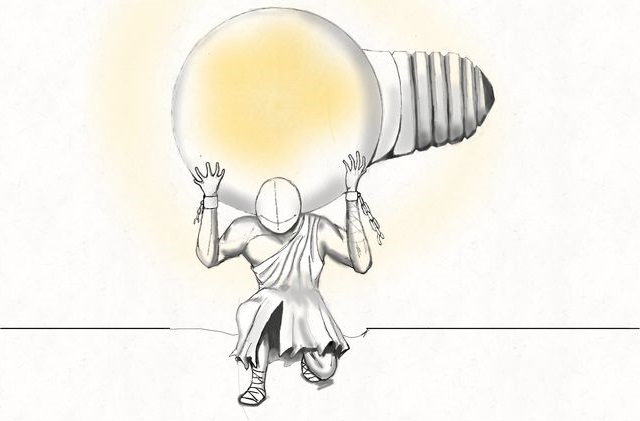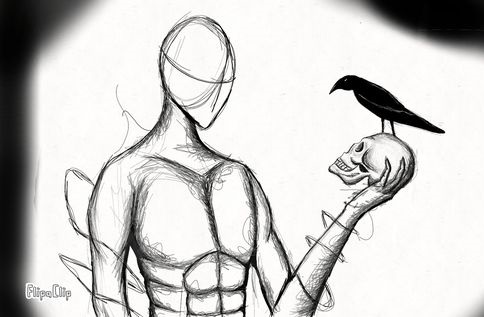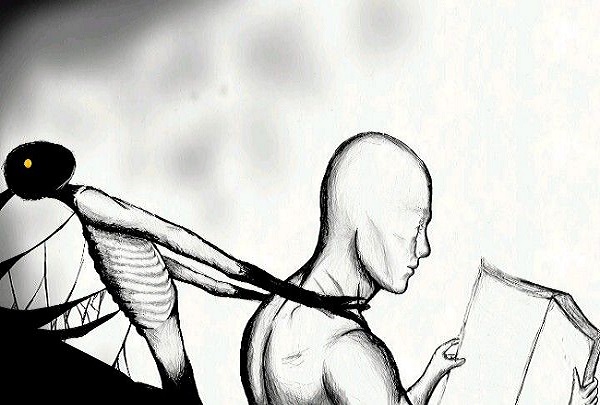Undoubtedly, creativity as a trait is regarded so highly. Professed and echoed is the phrase that creativity is everyone's birthright and that it is an innate attribute each individual possesses. Harboring creativity is deemed to be one’s ticket to paradise and means to transcend the bounds of the ordinary.
We express our appreciation towards creative individuals projecting our vision for them to be bright and full of promise. But, what does it mean to be creative? Is everyone gifted with creativity upon conception? Is it something everyone can strive to become? Is creativity granted only to a minority? Is it a blessing or a curse? Let us quench our inquisition and unravel the truth of creativity and the individual under its influence.
First off, let us set a context and strip off creativity of all the misconceptions it has been implicated with. To know what creativity means let us take into account what the experts have to say about it.
Robert E. Franken, a professor of Social Ethics at the Candler School of Theology, according to, Creativity is the ability to conceive ideas, possibilities, and alternatives that are useful in solving problems.
Linda Laiman on an erudite view of creativity states it as, the ability to generate novel insights, keen enough to perceive the underlying patterns that govern a certain behavior or function, being able to connect two unrelated phenomena, and being able to generate solutions to a problem. She further emphasizes that creativity is not limited to thinking but to executing your thoughts and bringing your ideas to fruition. To her, when you are limited to thinking, you are not creative, but rather imaginative.
Rollo May stated that creativity is the tendency to introduce new ideas into being, and that to harness it one must ground themselves in the boundaries of commitment, passion, and discipline. She also implies that possessing creativity is being able to see the world in new ways, sort of like a conscious awakening, she sees it as heightened consciousness or ecstasy.
From what those experts have to say, the trait creativity is associated with the ability to think, perceive and conceive novel thoughts and execute those revelations on the grounds of reality.
By the sound of it, creativity is truly praiseworthy, and the individuals who are characterized with it are without a doubt teeming with great potential.
Or is it?
Before you go and pursue your creative pursuits whether that would be learning to play an instrument, getting indulged in the realm of arts, or becoming the new Shakespeare or Leonardo Da Vinci, there are things you might want to bear in mind before you go and curse yourself with creativity.
Not Everyone is Creative as they believe themselves to be
Let's start off spoiling everyone with this blunt but honest truth. Let us come to terms with this seemingly offensive revelation, if creativity were to be distributed to everyone, then it loses all of its meaning. The fact that creativity came to be known because it is distinguished from person to person.
Gordon Torr, author of Managing Creative People: Lessons for Leadership in the Ideas Economy, states that creative individuals are different from other individuals, not because they possess a disposition that brands them creative but in a sense that pertains to their vital core, their perspective, and outlook towards life. He further emphasizes, "Believing that everyone can be just as creative as the next person is as ludicrous as believing that everyone can be just as intelligent as the next person, yet it has become almost universally accepted as a truism."
What makes creative individuals different?
Roger Beaty, a Postdoctoral Fellow in Cognitive Neuroscience, at Harvard University conducted research regarding how creative individuals’ minds are structured. Their finding state that three (3) parts of the brain are linked with highly creative networks, these are; the default network, executive control network, and salience network.
The default network is the brain region that is activated when an individual is engaged in spontaneous thinking such as; daydreaming, imagining, and mind-wandering. This region is also responsible for generating ideas, brainstorming, and problem-solving.
The executive control network is the region in the brain that is responsible for focusing and controlling the thought process. It plays a crucial role in evaluating an idea and assessing whether it would work.
The salience network is the region in the brain that acts as a switch between the executive control network, and the default network. Its role is to alternate between a state of generating ideas and evaluating their soundness.
Also, it is further stated that these regions are not activated simultaneously, meaning that if either of the regions is activated the rest are not. Their findings suggest that creative individuals are better at co-activating these brain regions that usually work separately, and their minds are structured, or wired differently.
This portrayal of creative individuals as regarded and beheld as unique is the source of their struggle. As indicated by Beaty’s findings that they are wired differently, and Torr’s further emphasis that they are different in terms of their perception and outlook on life, this seemingly unique characterization has an isolating effect on creative individuals.
Studies indicate that creativity and loneliness are linked
A study titled "The default network of the human brain is associated with perceived social isolation", asserts that being lonely exhibits more brain activity in the default network the region in the brain we've talked about that is responsible for imagination, mind-wandering, and brainstorming. This high brain activity in the default network is the brain's attempt to compensate for the social void. The default network is one of the three (3) regions in the brain that is founded to be one of the active components in reinforcing creative thinking.
With this, creative individuals due to the isolation they get for possessing a unique outlook towards life compensate for their loneliness by conjuring up creative thoughts to alleviate loneliness and entertain themselves with novel possibilities.
Ironic to think about how the very thing that gives creatives their edge can be their very bane. Their uniqueness is like a sword if one is not skilled enough to wield it then it can end up hurting them. A fire if not tamed can burn a settlement, but if one can harness it, one can use it to build a civilization.
So, how far can a creative individual's uniqueness become a thorn in their side? How can a creative's distinguishing trait become a burden?
1. Loneliness
With a brain that is complicatedly wired, and a mind operating at a different frequency, creatives tend to see the world from a different angle. Also, as they are inclined to unearth novel thoughts and ideas they tend to stray far from the conventional path and end up taking on a solitary undertaking towards intellectual novelty and self-actualization.
Also, naturally being a non-conformist further isolates them from the rest as they employ unconventional strategies to achieve a desired outcome. Others often shun creativity for staying ahead of their time through envy or due to the absence of any capacity to comprehend their revolutionary methodologies in solving a problem.
Copernicus is shunned for proposing a Heliocentric model of our universe, and branded as a blasphemer by the church.
Nikola Tesla, a brilliant engineer and inventor who revolutionized the use of AC was met with opposition that AC motors are impossible for practical applications and AC is hazardous and lethal.
Vincent Van Gogh, one of the artists who led the post-impressionism movement was criticized for the employment of his unconventional brush strokes which was deemed scandalous during his time.
2. Misunderstood
People often project a misconception about the image of creatives. In their heads, creatives are these individuals who can play the instrument well and can craft captivating pieces of art. They think of creatives as one who’s only inclined in the realm of arts while this notion is true for creatives their abilities and disposition extend far more than in the realm of arts.
There’s clear line between creatives and performers, creatives can innovate, and devise new ways to express themselves while performers only reenact what was done, or enact a creatives idea. Much of what the world has been wrought is made possible due to the creatives’ tendency to follow their curiosity and to deviate from the conventional path. Their willingness to embark on an uncharted path has paved the way for the world to engage in varied forms of discipline, and innovation.
An assertion from Phil Edwards’ article in the Vox is, Light bulbs, bicycles, nail polish, cheeseburgers, umbrellas, and laptops are products and inventions that made their way into our very households but we wouldn’t be able to enjoy the luxury they offer if the creatives who invented them were swayed by the people who think conventionally.
3. Exploitation
Some recognize creatives and the sheer potential that they possess and regard them only to be a means to an end. These exploiters value creatives because they fuel their selfish devices and continually pump cash to feed their greed. This trickery has been lurking in the shadows and has cast a snare on creatives seeking to fulfill their creative pursuits.
This phenomenon isn’t something new to behold it has transpired even to the notable creatives. The story of Prince highlights opportunists taking advantage of a creative.
The notable strife between him and Warner Bros battling for agency over his works showcases that even recognized creatives can still be ensnared by greed-driven juggernauts.
Taylor Swift, too, lost ownership of her tracks due to the record deal she signed when she was 14. She further states that she has been bullied by, Shaun reinforcing manipulative tactics to dismantle her work.
4. Self-Doubt
Possessing a natural heightened sense of awareness creatives often find themselves paralyzed with self-doubt. Normally that is, because having a keen sense of awareness allows creatives to see their inadequacy.
Psychology professor, Adam Grant in his TED talk states from his research that creative people especially those we deem to be outwardly confident are grappling with thoughts of self-doubt. But, rather than being paralyzed by the sway of their insufficiencies, they leverage this awareness to further refine themselves.
Even renowned artists, authors, and leaders are suffering apprehension as much as any creatives. Rose Leadem, a writer in Entrepreneur wrote in her article that the creatives who contributed to much of the world such as Leonardo Da Vinci, Michaelangelo, George Washington, Abraham Lincoln, John F. Kennedy, and of course, Vincent Van Gogh suffered from imposter syndrome.
5. Rejection
As if the internal conflict creatives suffer from wasn't weigh them down, they also have to deal with external nuances that inflict them with further doubts. But there is a far more heart-wrenching truth people don't want to hear, especially for creatives, although they suspected it all along. People just don't like creatives.
A study from the University of Pennsylvania shows that the people professing they want creatives, but when introduced to creative ideas they display an aversion towards it.A study titled, "Creativity: Asset or Burden in the Classroom?" shows that students exhibiting authentic creativity were unappealing before the teachers. Teachers were asked to rate their favorite students, study shows that favorite students exhibit less creative traits and less favorite students displayed more creative traits. The study also shows that teachers have their teacher-generated creativity prototype that acts as a criterion for judging creativity.
A researcher at the University of California, Barry Staw who specializes in creativity asserts that creative figures are celebrated and are venerated as heroes but what the people celebrate in truth are its after-effects. Only when people come to see what they, see, only when people come to understand the thought they bore in mind are these creatives hailed as heroes. Before any of the glory, they are greatly persecuted.
6. Monetization
No doubt creatives are exceptional at introducing novel innovations that could be a catalyst for change. But as we've talked before, when these creatives introduce their products, they were met with hostility, smitten with ridicule, discouraged, and shunned by the society they sought to inspire. Also, it could be that creatives have a prototype for a revolutionary product but lack the financial means to bring it to fruition.
Jordan Peterson, a prominent clinical psychologist states that creativity isn't something you want to curse yourself with. It might profitable venture but the associated high return is proportional to the risk it poses.
He further states that if you introduce something new to society, no one knows what it is, and people when they don't understand something often ridicule it, and it may take some time to convince people and endure all the rejections.
7. Deviance
Naturally, creative individuals are non-conformists, they don't follow the conventions they view the conventional structure of society as something that inhibits their potential from being realized.
Creatives are the embodiment of fluid, when a fluid is introduced into a container, it continuously grows until the container could contain it no more, attempts to contain this ever-growing power will result in ruin and destruction. Also, like fluid, creative individuals are adaptable, like water flowing when it encounters an obstacle it changes its direction to continuously flow onwards.
A journal article by, Joseph E. Harrington, Jr. titled "Rigidity of Social Systems" states that the social system is being modeled in a hierarchical structure, and for one to be able to scale up is to imitate those above, which is the exact opposite of creatives for they revel in their uniqueness.They further assert that volatile environments cause people to be resistant to change. With this, we can see that people are resistant to change.
Chris Pennigton, in his article titled "We Are Hiredwired to Resist Change', states that part of the brain we know as the amygdala interprets change as a threat and releases hormones for fear, fight, or flight. But creatives operate in the highly creative network of the brain that makes them prone to imagining possibilities which usually takes them out of the box.
8. Burnout
Creatives as passionate as they can often neglect their well-being due to the excitement of bringing their ideas to life. Though deemed to be enormous powerhouses and agents of change, they have their limits as much as everyone else. Burnout is the notion where a person runs out of fuel, or some may term it, "creative juice" to keep their passion burning.
Many factors contribute to creatives getting burned out. Since fewer people know what Creatives are up to it gets frustrating to not receive any external assurance. Often than not, they receive quite the opposite, ridiculed, scorned, and contempt for their authenticity. This lack of understanding and appreciation only adds to the weight they carry.
Do you still wish to become creative?
Knowing the strenuous and enduring path an authentic Creative must tread, it can be undeniably and dreadfully challenging when the odds are stacked up in against their favor. But, like how diamonds are formed, it has to be subjected to a context that is seemingly impossible to withstand only to emerge as something entirely astonishing, harder, resilient, and enduring than before.
It is the pain, and hardships that define our strengths, the absence of such, will not result in any of our venerated figures of creative individuals who shaped our world. As Frederick Nietzsche said, "Whatever doesn't kill you makes you stronger". Savor and revel in the trying moments for it is an opportunity to exercise our power, and develop our resilience far more than ever.
Here is the twist
Everyone is not creative but they can certainly become one. Michael Michalko, Author of Creative Thinkering states that, "People who believe they are not creative have a set of beliefs that gives them the excuse not to even try to be creative. So people who say they are not creative are people who have seldom if ever, tried to be creative ".
From Michalko's statement, the very thing it takes to become creative is to believe you are one and to act like one. And, through that belief, we seek to express ourselves to become aligned with it. And it is the belief that set Creatives apart from anyone.
Creatives are not restrained or bounded by the notion of impossibility, their minds are inclined towards possibilities, imagination, and how best to bring those visions into reality. As Einstein said, "Imagination is more important than knowledge because knowledge is limited but imagination encircles the world".
I want to end this post with a quote from A Monster Calls that woke something in me, "Your belief is valuable, so you must be careful where you put it and in whom'.


